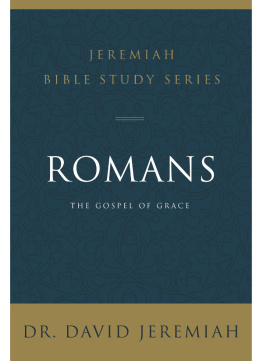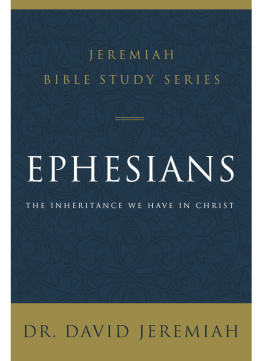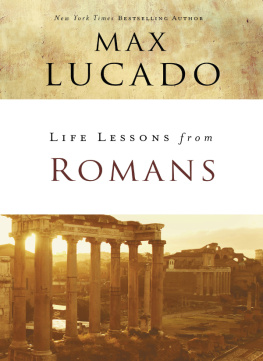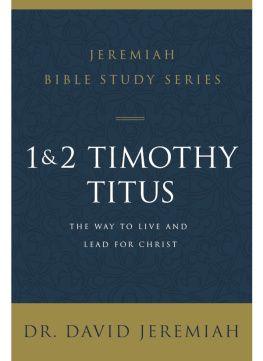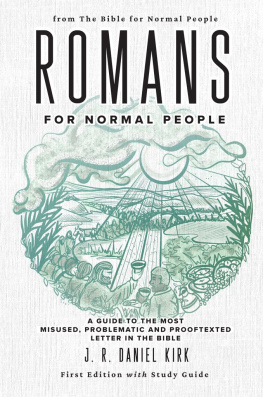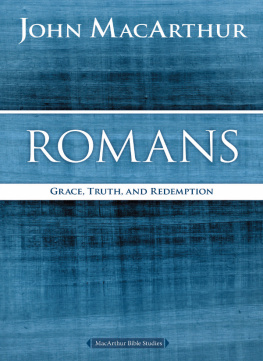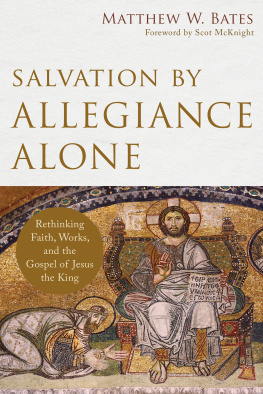In this ebook edition, please use your devices note-taking function to record your thoughts wherever you see the bracketed instructions [Your Notes] or [Your Response Here]. Use your devices highlighting function to record your response whenever you are asked to checkmark, circle, underline, or otherwise indicate your answer(s).
INTRODUCTION TO
The Letter to the Romans
For all have sinned and fall short of the glory of God (Romans 3:23). With these words, the apostle Paul explains the basic problem all human beings share... and how we must all face the consequences for our sins (see 6:23). However, as Paul goes on to describe in his letter to the Romans, the good news is that God loves us in spite of our sin (see 5:8) and offers us a clear-cut path on how to receive His forgiveness and experience His salvation (see 10:910). Pauls letter to the Romans is simple in its explanation of the gospel, yet complex enough to challenge the hearts and minds of some of the greatest thinkers in Christian history, including Augustine, Martin Luther, and John Wesley. Paul explores the complexities that form the foundation of our simple faith, contrasts justification by grace and justification by law, and even describes his own struggle to live a sanctified life. Through it all, he lays a cornerstone of Christian theology.
A UTHOR AND D ATE
The author of this letter identifies himself as Paul, a bondservant of Jesus Christ, called to be an apostle (1:1), and the epistle contains a number of references that align with known details about his life. The doctrine in the book is also typical of Paul, including his explanations of justification by faith (see 3:2022), the use of spiritual gifts in the church (see 12:38), and taking care of those in need (see 15:2528). For these reasons and more, the leaders of the early church were nearly unanimous in their acceptance of his authorship. References in the New Testament (specifically in Acts and 1 and 2 Corinthians) suggest that Paul wrote the letter while he was residing in Corinth during his third missionary journey. Based on Pauls travel plans and the timetable for navigating the Mediterranean Sea, this means he likely wrote the letter in the fall of AD 57.
B ACKGROUND AND S ETTING
Little is known about the origin of the church in Rome, including who founded it or when it was established. Some scholars suggest that new believers who witnessed the coming of the Holy Spirit on the Day of Pentecost in Jerusalem returned to Rome to start a congregation. Little also is known about the believers themselves in Rome, yet it is clear from Pauls opening words in his letter that they were a well-established community and known for their faith (see 1:810). Pauls knowledge of the Roman church came secondhand, for when he wrote the letter, he had yet to visit them (see 1:1112). This was not due to a lack of interest, for ministering in Rome was one of the apostles greatest desires. The Holy Spirit, however, had other plans for him. When Paul did make it to Rome, it was as a prisoner, waiting to stand trial before Caesar.
K EY T HEMES
Several key themes are prominent in Pauls letter to the Romans. The first is that justification (being made righteous before God) comes by faith alone in Christ. Paul explains that all have sinned and stand condemned for failing to live up to Gods standard of righteousness (see 1:193:20). Some had claimed the way to achieve this righteousness (and thus attain salvation) was by following the Old Testament law. However, while Paul agrees the law is good for teaching about Gods holiness, our sin, and Gods ultimate plan for redemption, he concludes the law itself is powerless to save. Only faith in Jesus can bring salvationit cannot be earned through good works or obedience to the law (see 3:215:21). Justification is therefore a gift from God that He makes available to us through the death and resurrection of His Son.
A second theme is that God calls us to lead sanctified lives (see 6:18:39). To be sanctified means to live according to Gods design and purpose. God calls us to be holy and set apart from the world to do His work. However, even though we are no longer slaves to sin, we still have a sinful nature that resides within us. This creates a constant struggle between our desire to live godly lives and our desire to indulge our baser instincts. The Holy Spirit, who dwells within us, is our constant and powerful ally in this lifelong battle.
A third theme is that God is sovereign and His plans never fail (see 9:111:36). Some people in Pauls day were claiming that Gods purposes had failed with Israel because the nation had generally rejected Jesus as their promised Messiah. Paul counters this argument by first reminding his readers that God is sovereign and does not always share His plans with humanity. Further, he explains that God has always had a plan for Israeland these plans have not concluded even though they have not accepted Christ. Paul calls on the Gentile believers to not be proud but to remember they have been grafted in to Gods greater plan for humanity.
A fourth theme is that believers in Christ need to walk in righteousness (see 12:115:13). The apostle Paul believed that when we receive the gift of Gods salvation, it naturally produces a change within usincluding a desire to turn away from our former lives of sin. The Holy Spirit comes to dwell within us and bestows gifts that will not only help us to lead a holy life but will also help us to serve and support other members in the church. Our new lives in Christ give us a new attitude on how we view those in authority, how we love our neighbors, how we work for Christ until His return, and how we accept and love others without judging them.
K EY A PPLICATIONS
Many scholars today regard Romans as the greatest of Pauls letters and one of the foundational documents of Christianity. Paul addresses various topics, but all point to the truth that a loving God has offered salvation to a sinful humanity through the death and resurrection of His own Son. Reading the letter often feels like being swept along in a rapids, but in the end it leads us to the conclusion that we serve a God who is always merciful to us and always faithful to fulfill His plans for us. He has offered freedom from sin to anyone who accepts the sacrifice of Jesus. His grace and power are available to all who believe!

